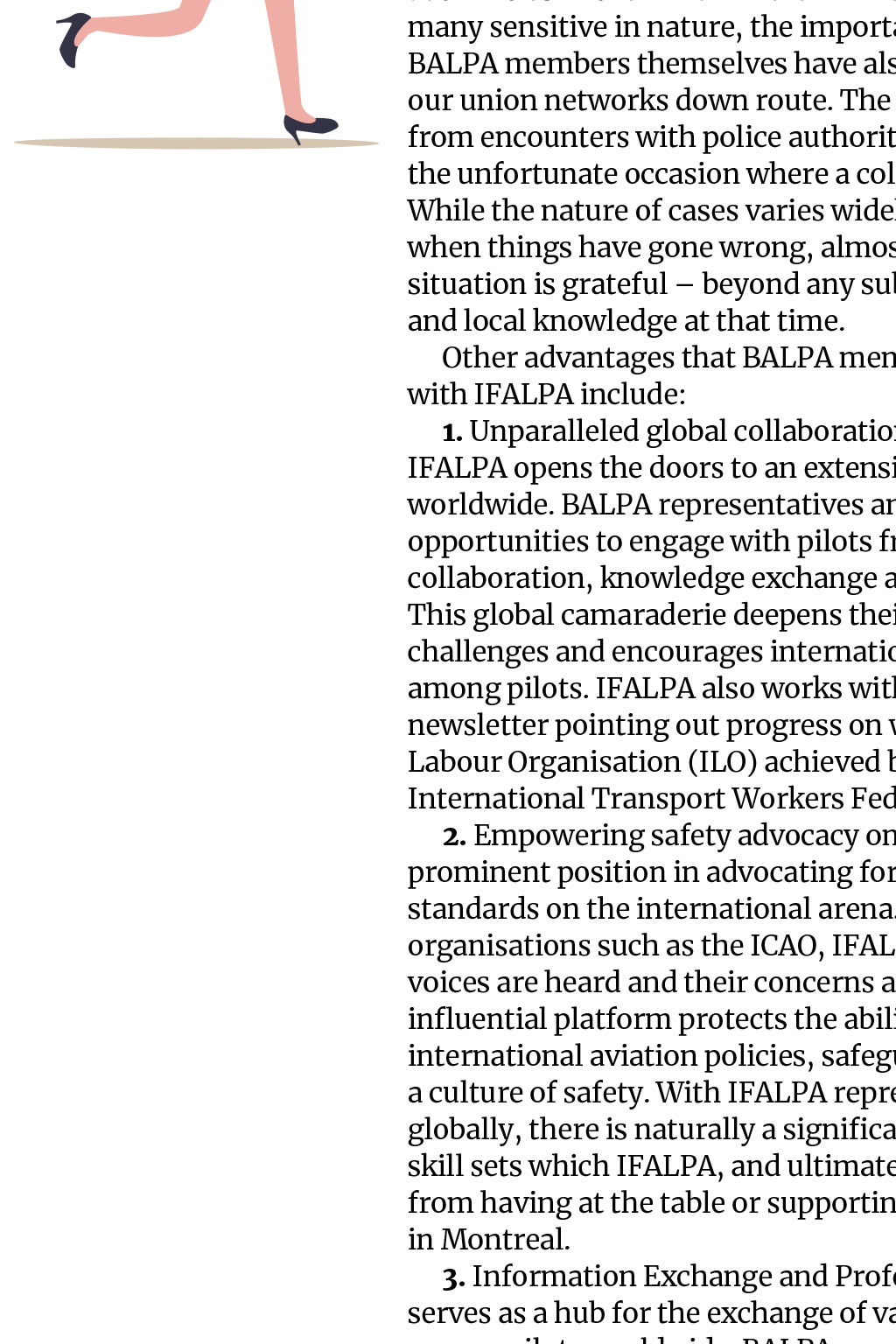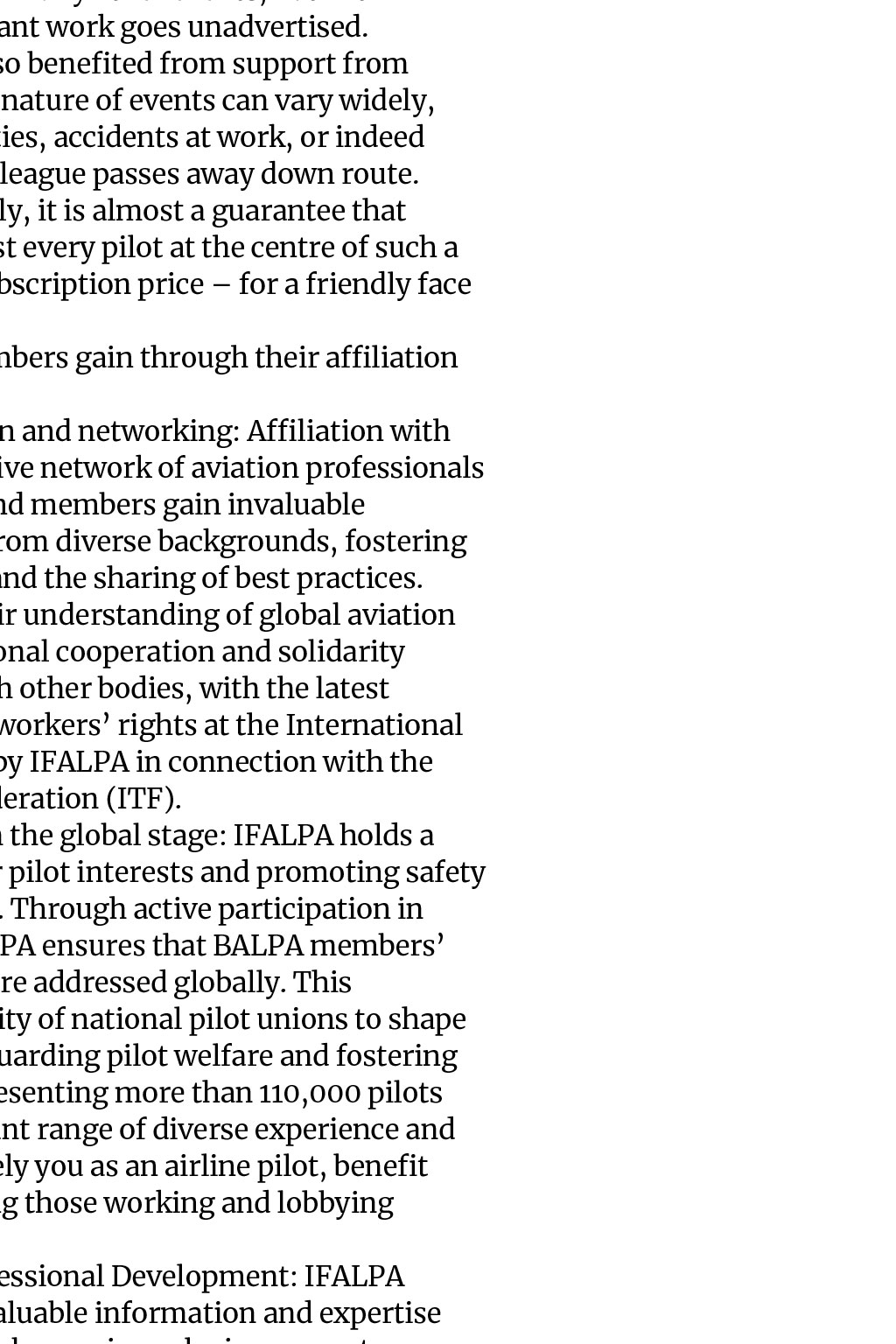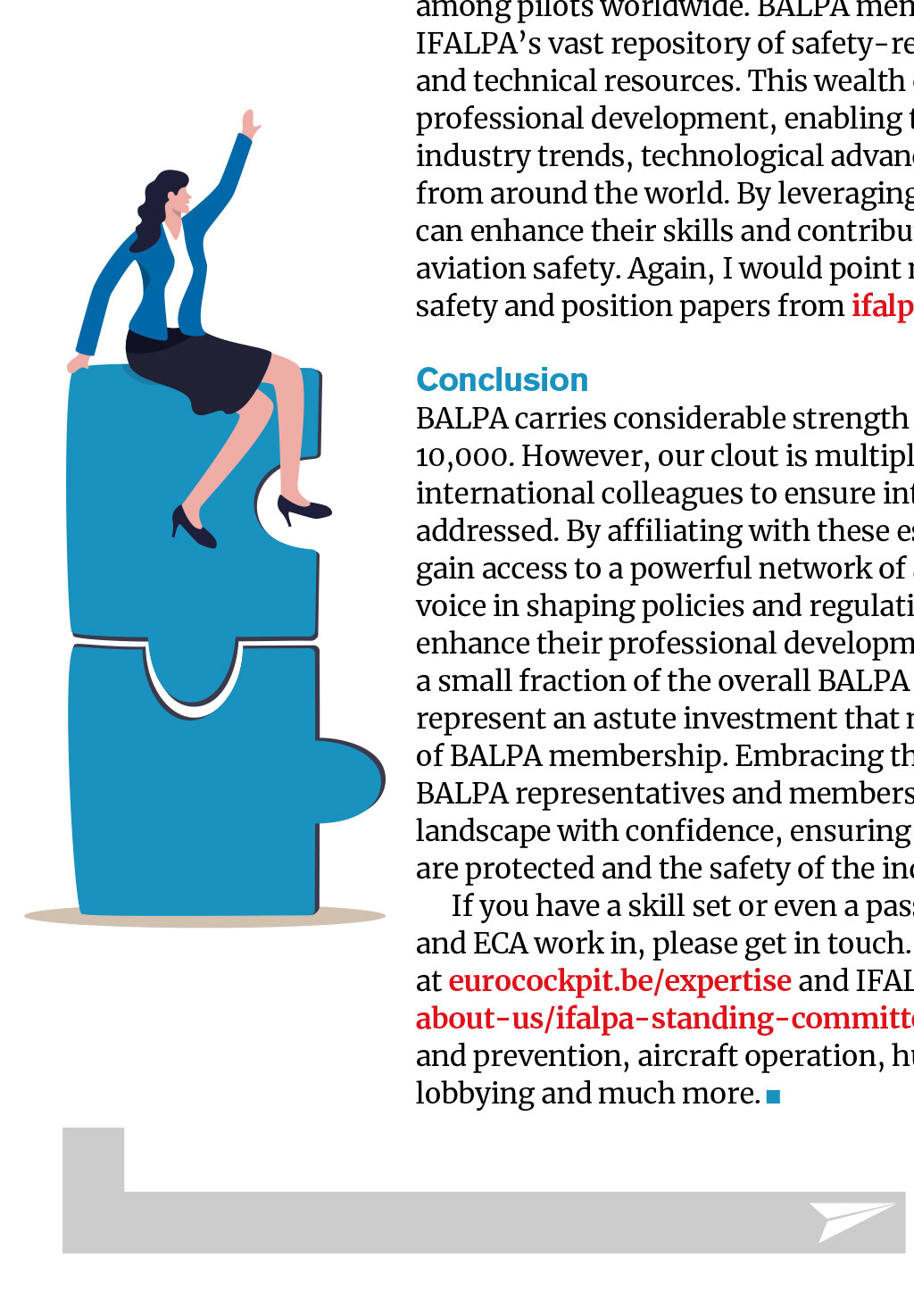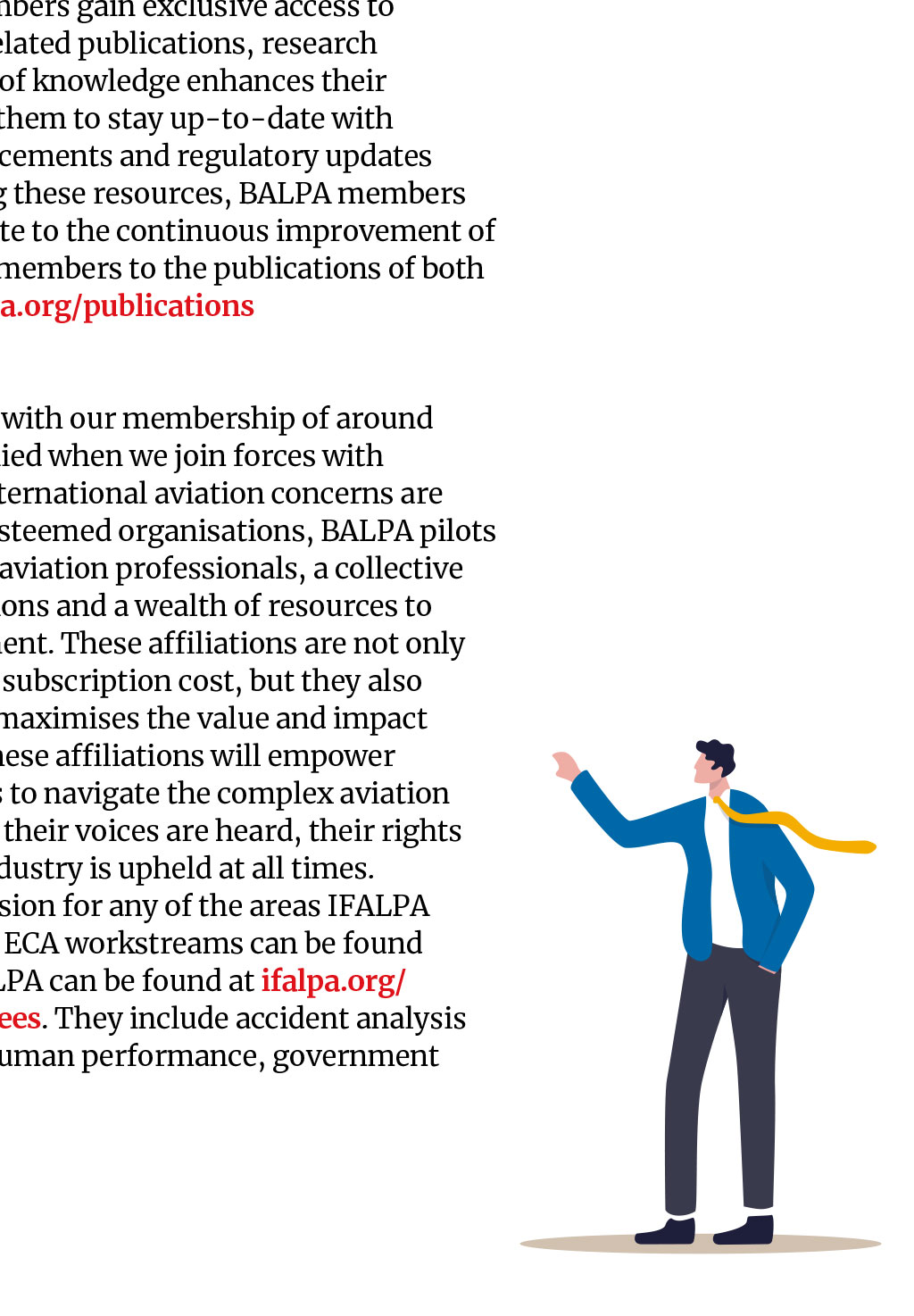






























ECA /IFALPA By Mark Keen In an industry as dynamic and challenging as aviation, pilots need unwavering support and a united front to address the multitude of issues they face. Recognising this imperative, pilot associations worldwide joined forces to advocate for the interests and welfare of pilots. Major issues likely to be relevant at international level in the coming months and years include social and employment contract legislation, extended minimum crew operations and sustainability. But first, going back a little, in 1944, the Chicago Convention was ratified by 52 signatory states, later rising to 193. This important convention shaped future international rulings of critical importance to pilots, with articles covering themes like pilot licensing, the authority of the pilot in command and certificates of airworthiness. The Chicago Convention also instigated the birth of the International Civil Aviation Organisation (ICAO) in 1947, founded to develop the various convention articles and ultimately support international aviations safe and orderly growth. ICAO came off the back of the Chicago Convention on International Civil Aviation. The international transborder nature, role and power of ICAO left national pilot unions without a voice. In 1948, pilots responded by founding the International Federation of Air Line Pilots Associations (IFALPA). BALPA played a central founding role. IFALPA, like ICAO, is based in Montreal, Canada. International Air Transport Association (IATA), the association for airline operators, was founded around the same time and is also based in Montreal. Some time later, within Europe, the Single European Act of 1986 and the completion of the internal market set the ground to turn the national aviation markets into a single market for air transport. The single market saw control over many aviation regulations shift from the individual Member States to the European Union. As in the 1940s, individual pilot unions and associations lost their direct influence on a number of important themes, including flight time limitations, flight crew licensing, security, economic regulation of air transport and certain social aspects. In 1991, the European Cockpit Association (ECA) was founded in the heart of the EU to become the representative voice of Europes airline pilots towards the EU institutions. While on the surface Brexit might suggest European policy is no longer relevant, pilots in the UK do not operate in a vacuum; our rulesets are so intertwined with European Union Aviation Safety Agency (EASA), and so many of our employers are trans-European borders. This article aims to illustrate the exceptional advantages that BALPA members gain from their subscriptions to ECA and IFALPA, emphasising the remarkable value these affiliations provide. European Cockpit Association (ECA) The ECA serves as a representative body, uniting pilot associations across Europe. Its primary objective is to champion the interests of pilots in critical areas such as safety, security and working conditions. Among the compelling reasons why BALPA affiliates with the ECA are: 1. Collective bargaining power: Information is power. By joining forces with the ECA, BALPA amplifies its collective bargaining power when negotiating with airlines, regulatory bodies and other influential stakeholders. ECA provides a communication network where information and benchmarking data can be quickly captured, or employer data can be verified. There are also many strategic initiatives. Through ECA, pilot unions have collectively funded support for pilots seeking to organise in highly influential trans-national airlines such as easyJet, Ryanair and Wizz Air. Supporting those pilots and achieving recognition has obvious industrial benefits for all, but does not happen without the leadership, resourcing and multi-union cooperation. 2. Shaping aviation policies: The ECA actively engages with regulatory bodies such as EASA and the European Commission, ensuring that pilot perspectives play a crucial role in shaping European aviation policies and regulations. BALPAs affiliation with the ECA retains our ability to exert some influence in Europe, while also assisting us in ensuring any postBrexit changes in the UK do not undermine the safety and employment standards we currently hold. Regulation impacts almost every facet of our industry; FTLs, third country wet-leasing, aviation, general employment and social laws. For members to have a voice at the highest level, international affiliations are imperative. 3. Access to cutting-edge safety initiatives: With a steadfast commitment to enhancing aviation safety, the ECA spearheads various safety initiatives through its dedicated safety committee and specialised working groups. From human factors training to fatigue management and technological advancements, BALPA members and representatives gain exclusive access to these resources, assisting our profession to stay at the forefront of safety practices and contribute to raising the standards within our own organisations and those we are stakeholders in. The ECAs annual report is a concise document for those of you who wish to quickly get up to speed on what the body is currently doing on your behalf; 2022 ECA Annual Report (bit.ly/ECA2022Report) While the nature of cases varies widely, when things have gone wrong, almost every pilot at the centre of such a situation is grateful for a friendly face and local knowledge Additionally I would strongly encourage you to review the positions section of the ECA website and consider signing up to their newsletter. Current position papers include: Position Paper_Positive Organisational Culture in Aviation (bit.ly/CultureInAviation) Position Paper_Unauthorised Flying of Drones Near Airports (bit.ly/DronesNearAirports) Position Paper_Manual On The Legal Principles Of Industrial Relations (bit.ly/LegalIndustrialRelations) Position Paper_Securing A Sustainable Future For Aviation, The Pilots Perspective (bit.ly/SustainableFutureAviation) International Federation of Air Line Pilots Associations (IFALPA) IFALPA is a global federation representing more than 100 pilot associations worldwide. With its overarching objective of promoting the highest level of aviation safety, IFALPA serves as an essential catalyst for BALPA members professional growth and global influence. IFALPA is structured with purpose and largely its structure and committees mirror ICAO. IFALPA is a permanent observer on ICAOs Air Navigation Commission and the ICAO Council. On the network and mutual assistance side, many of the benefits of IFALPA are delivered quietly and without fuss. In my own time as a representative, I have seen American and Japanese pilots benefit from immediate emergency assistance and significant later assistance post incidents, be it with authorities or the AAIB. There will be many other events, but with many sensitive in nature, the important work goes unadvertised. BALPA members themselves have also benefited from support from our union networks down route. The nature of events can vary widely, from encounters with police authorities, accidents at work, or indeed the unfortunate occasion where a colleague passes away down route. While the nature of cases varies widely, it is almost a guarantee that when things have gone wrong, almost every pilot at the centre of such a situation is grateful beyond any subscription price for a friendly face and local knowledge at that time. Other advantages that BALPA members gain through their affiliation with IFALPA include: 1. Unparalleled global collaboration and networking: Affiliation with IFALPA opens the doors to an extensive network of aviation professionals worldwide. BALPA representatives and members gain invaluable opportunities to engage with pilots from diverse backgrounds, fostering collaboration, knowledge exchange and the sharing of best practices. This global camaraderie deepens their understanding of global aviation challenges and encourages international cooperation and solidarity among pilots. IFALPA also works with other bodies, with the latest newsletter pointing out progress on workers rights at the International Labour Organisation (ILO) achieved by IFALPA in connection with the International Transport Workers Federation (ITF). 2. Empowering safety advocacy on the global stage: IFALPA holds a prominent position in advocating for pilot interests and promoting safety standards on the international arena. Through active participation in organisations such as the ICAO, IFALPA ensures that BALPA members voices are heard and their concerns are addressed globally. This influential platform protects the ability of national pilot unions to shape international aviation policies, safeguarding pilot welfare and fostering a culture of safety. With IFALPA representing more than 110,000 pilots globally, there is naturally a significant range of diverse experience and skill sets which IFALPA, and ultimately you as an airline pilot, benefit from having at the table or supporting those working and lobbying in Montreal. 3. Information Exchange and Professional Development: IFALPA serves as a hub for the exchange of valuable information and expertise among pilots worldwide. BALPA members gain exclusive access to IFALPAs vast repository of safety-related publications, research and technical resources. This wealth of knowledge enhances their professional development, enabling them to stay up-to-date with industry trends, technological advancements and regulatory updates from around the world. By leveraging these resources, BALPA members can enhance their skills and contribute to the continuous improvement of aviation safety. Again, I would point members to the publications of both safety and position papers from ifalpa.org/publications Conclusion BALPA carries considerable strength with our membership of around 10,000. However, our clout is multiplied when we join forces with international colleagues to ensure international aviation concerns are addressed. By affiliating with these esteemed organisations, BALPA pilots gain access to a powerful network of aviation professionals, a collective voice in shaping policies and regulations and a wealth of resources to enhance their professional development. These affiliations are not only a small fraction of the overall BALPA subscription cost, but they also represent an astute investment that maximises the value and impact of BALPA membership. Embracing these affiliations will empower BALPA representatives and members to navigate the complex aviation landscape with confidence, ensuring their voices are heard, their rights are protected and the safety of the industry is upheld at all times. If you have a skill set or even a passion for any of the areas IFALPA and ECA work in, please get in touch. ECA workstreams can be found at eurocockpit.be/expertise and IFALPA can be found at ifalpa.org/ about-us/ifalpa-standing-committees. They include accident analysis and prevention, aircraft operation, human performance, government lobbying and much more.